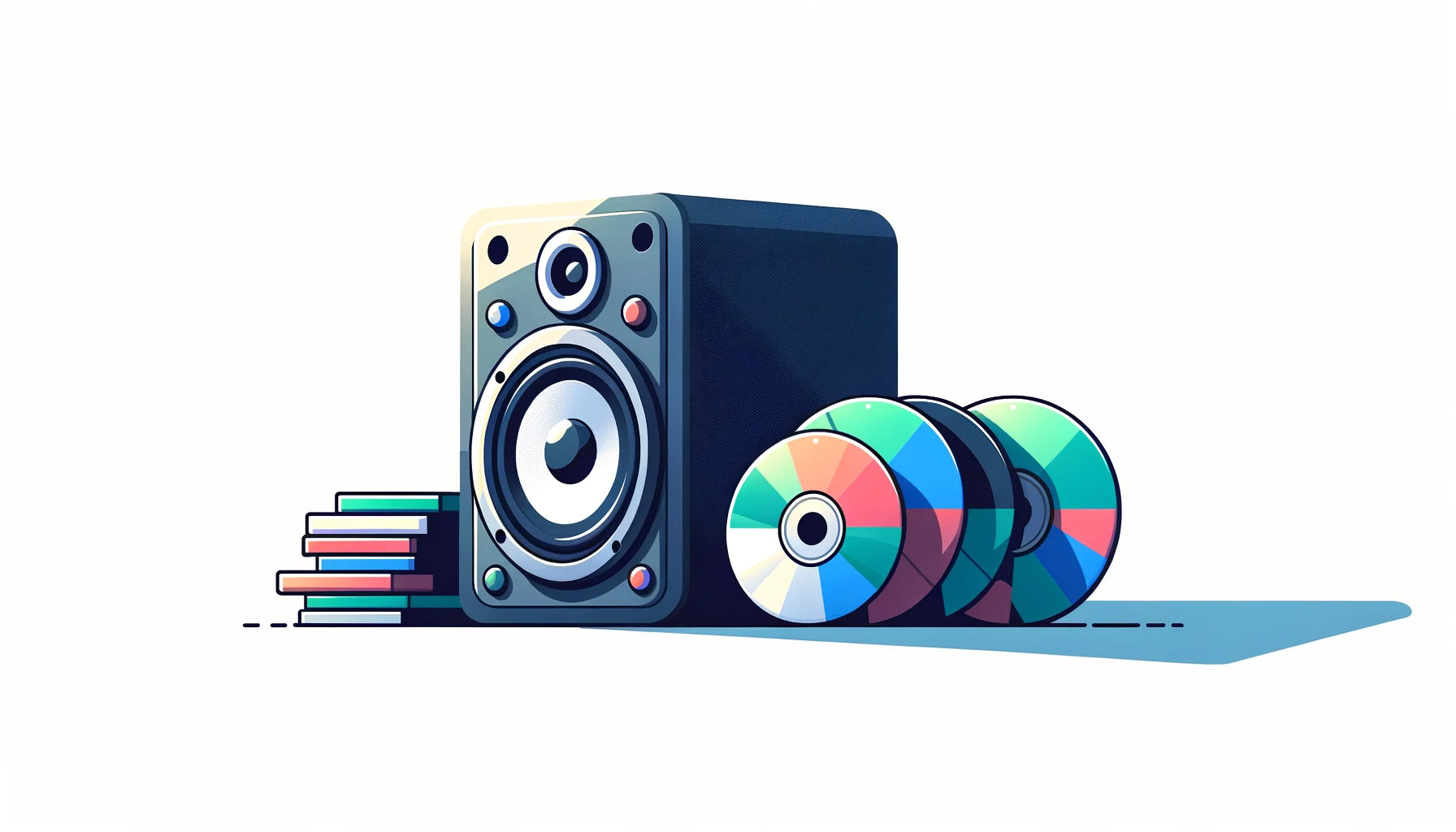How to Create Catchy Radio Program & Podcast Episode Titles
You can draw more listeners for your radio station or podcast by coming up with catchy episode titles. Find out how.
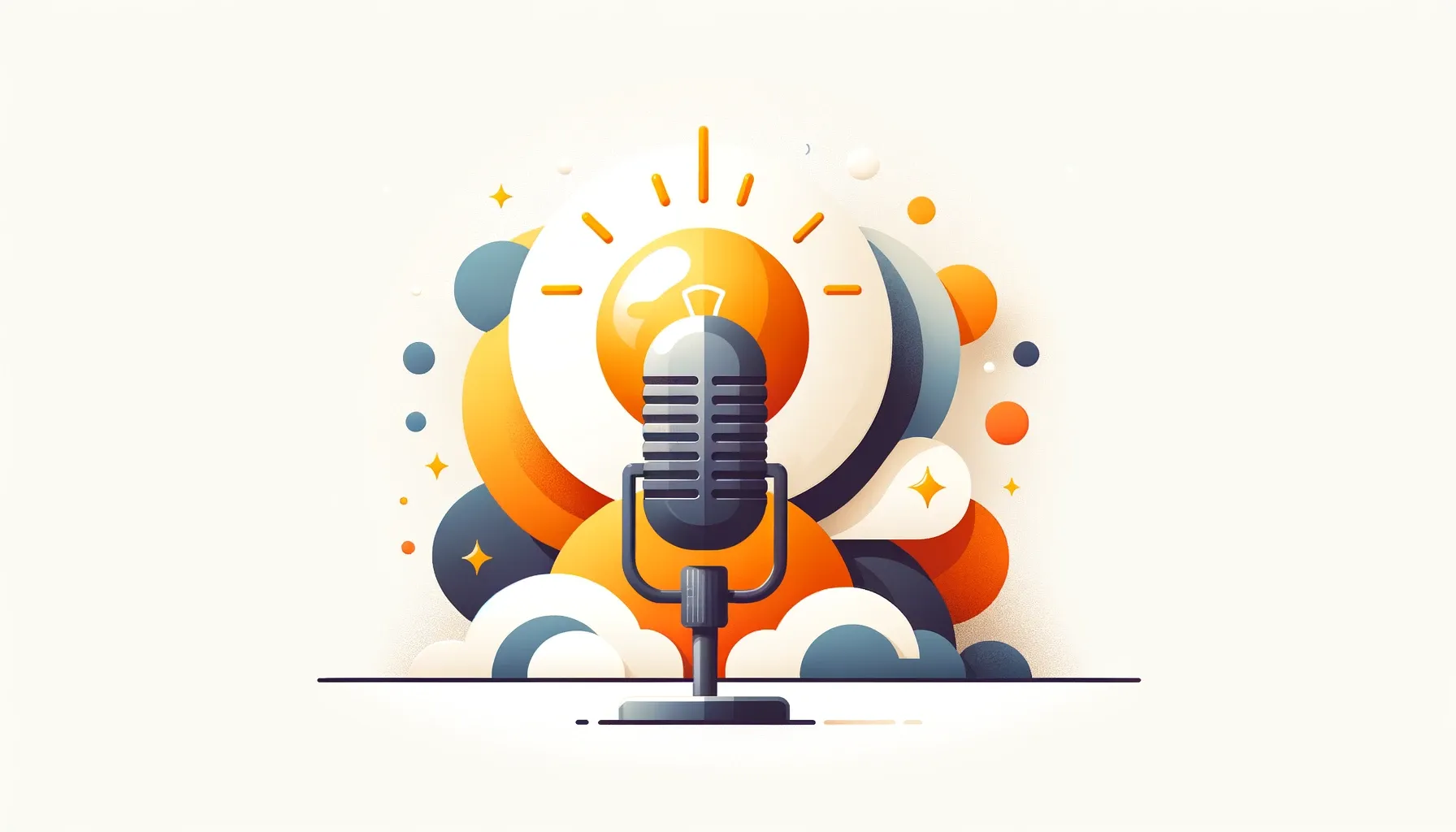
Headlines sell newspapers.
Similarly, a catchy radio or podcast episode title can compel listeners to stop browsing through the directory and click on your show.
In turn, you get more listeners, and everyone is happy.
Coming up with original and attractive episode titles may not be straightforward. Your usual process may entail coming up with several title ideas, crossing out the dull ones until you find something noteworthy.
Sometimes you stumble on great titles, and other times you pick the least desirable option.
We want to recharge your creative juices by presenting 12 episode title ideas with examples from actual shows.
Let’s get started:
12 Catchy Radio & Podcast Episode Title Ideas
Before we begin, you may appreciate a little back story on how we found these great naming strategies.
We combed through hundreds of podcast episodes, looking for titles that automatically jumped out of the page. Titles that made us want to stop and listen.
Examining the titles revealed the underlying formulas used in creating them. You can use the same process to expand on our list. So—here are some episode title ideas for your next project:
1) Pose a thought-provoking question
Posing your title as a thought-provoking question can spark a fascinating discussion on a heavy topic. It can even contribute to a better episode, as you will have fresh perspectives on a problem.
The first example of a thought-provoking question used effectively as an episode title comes from the podcast Land of the Giants. It asks, “Should we break up Google?”
The creators pose this question because it’s virtually impossible to go online without using Google’s products. It plays into the ongoing debate of the power of big tech and its overwhelming influence.

Hidden Brain also had this thought-provoking question on a recent podcast asking, “We Broke the Planet. Now What?”
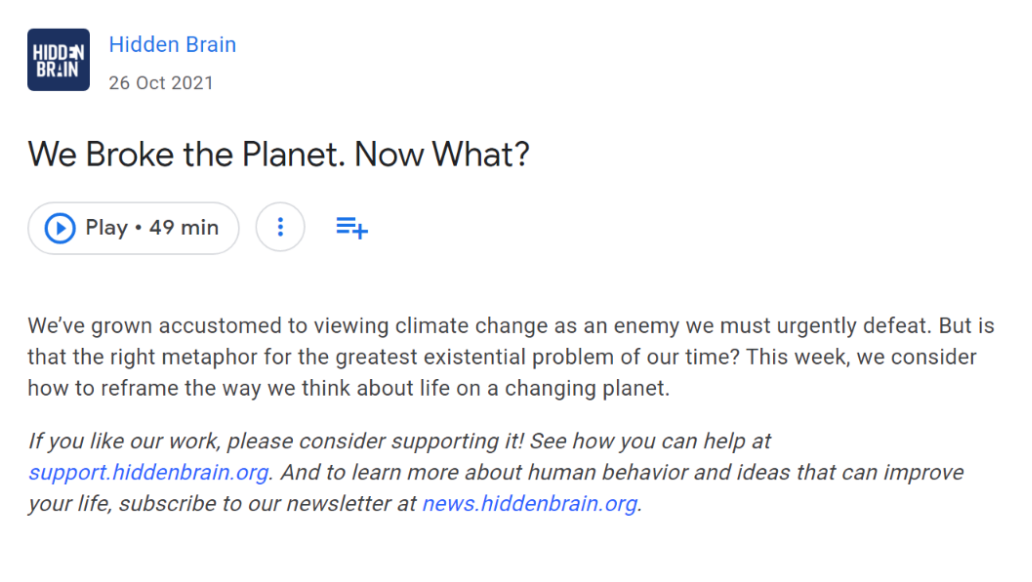
2) Mention well-known guests
If you are interviewing someone well known to your audience, you can mention their name as part of the title.
SmartLess uses celebrity guest names as episode titles, for instance, “Tom Hanks and Joe Buck.”
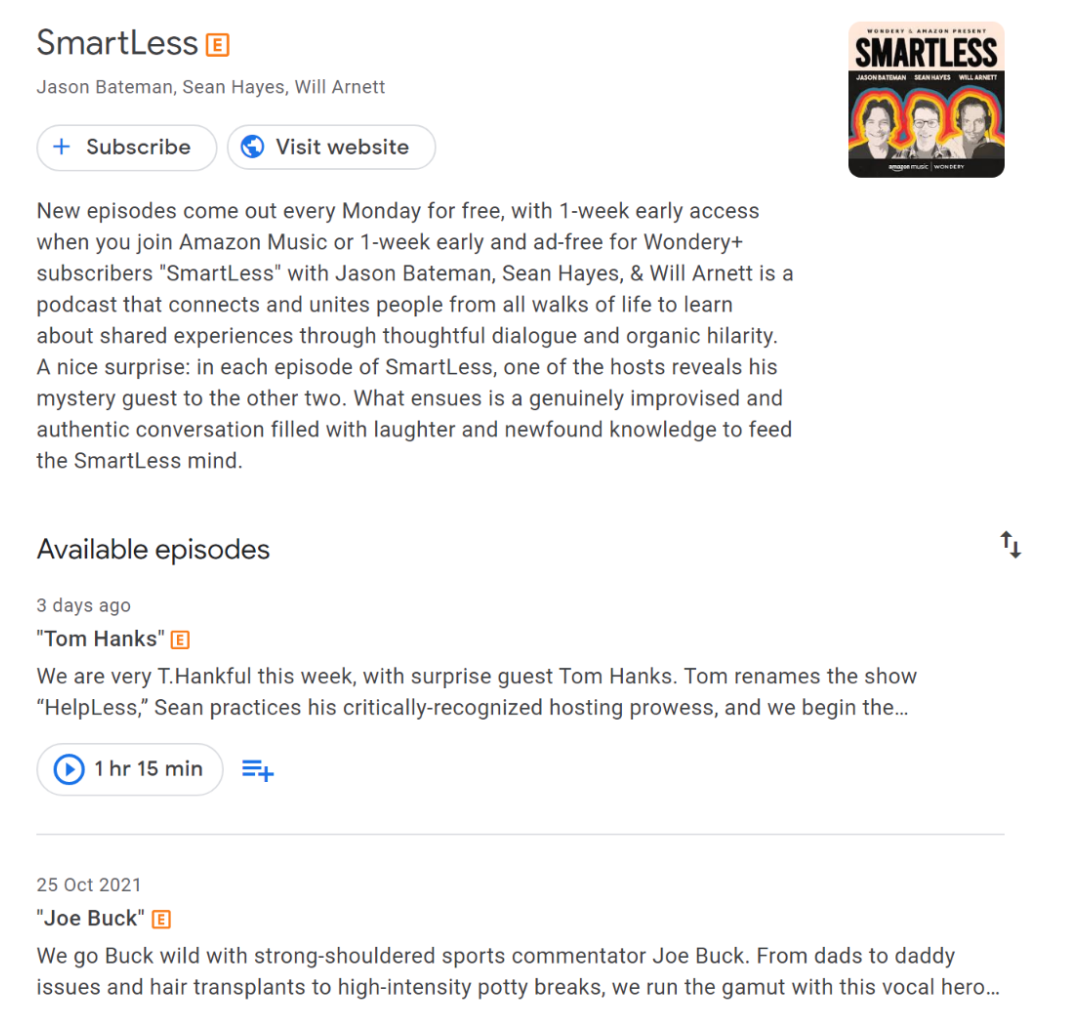
Some take this advice to mean that you should only mention celebrities.
As long as someone has done something notable and generated public interest, make it a requirement to include their name. For instance, you can still mention a relatively unknown author.
3) Talk directly to listener, “You”
The advice here is quite simple.
Talk directly to the listener by including a “You” in the episode title. It creates a bond and enhances rapport and trust.
The Mindset Mile podcast effectively did this by naming their 30th episode as “Being You is Your Superpower.”
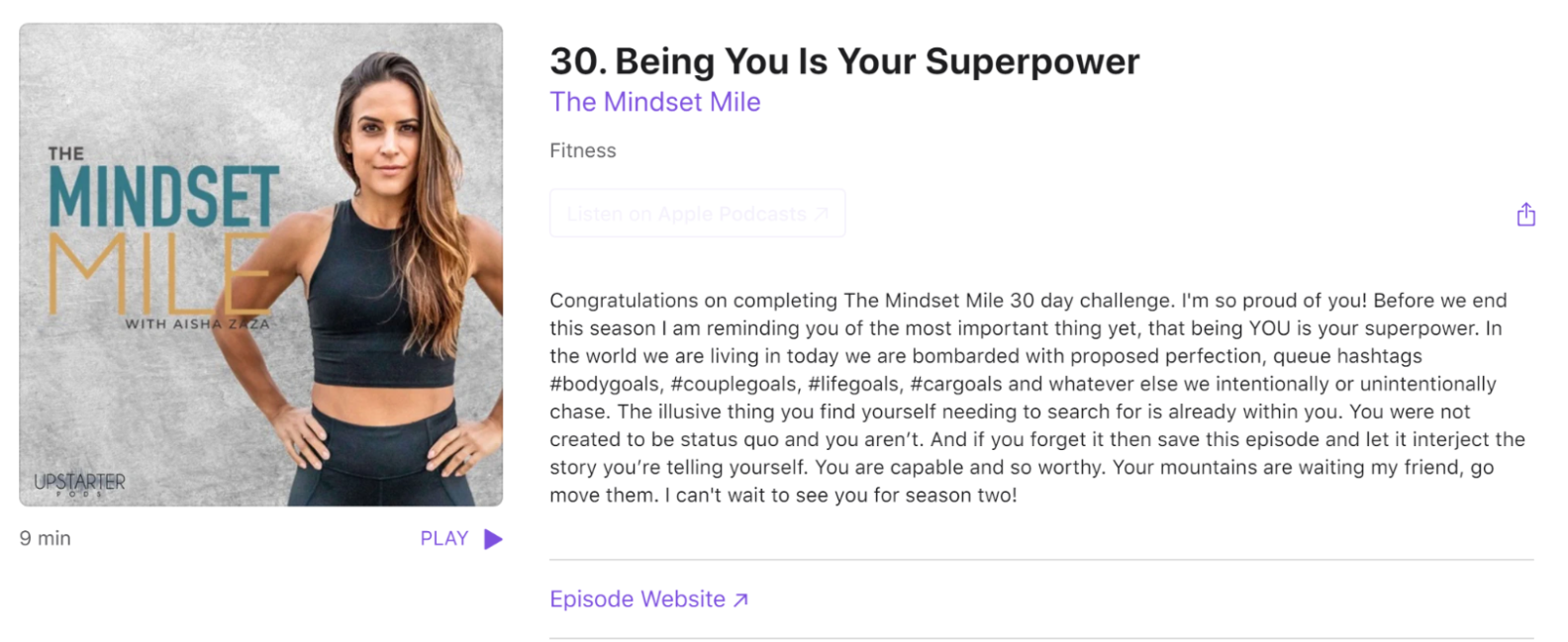
4) This vs. This (Comparisons)
Comparisons are rather intriguing because they have an element of conflict. The listener is invested in discovering who will come out on top. That’s why this particular podcast title by Land of the Giants again caught our attention, “ Netflix vs. Hollywood.”
In the actual episode, it’s not a requirement to compare two things. But if you’re weighing the benefits, wrongs, or circumstances facing two or more groups, you can effectively use the comparison title format.
For instance, if you’re discussing voting blocs in the country, you can title the show “Middle America Vs. The East Coast - Who Decides the Election?”

5) Storytelling
Does your episode revolve around narrating a story that took place: a murder, a crime, a genocide?
Use this highly intriguing approach by giving a summary of a story that’s taking place.
Baking A Murder utilizes this approach in their catchy titles, such as “She snuck into a psychiatric study & found “patient #5” went missing.”
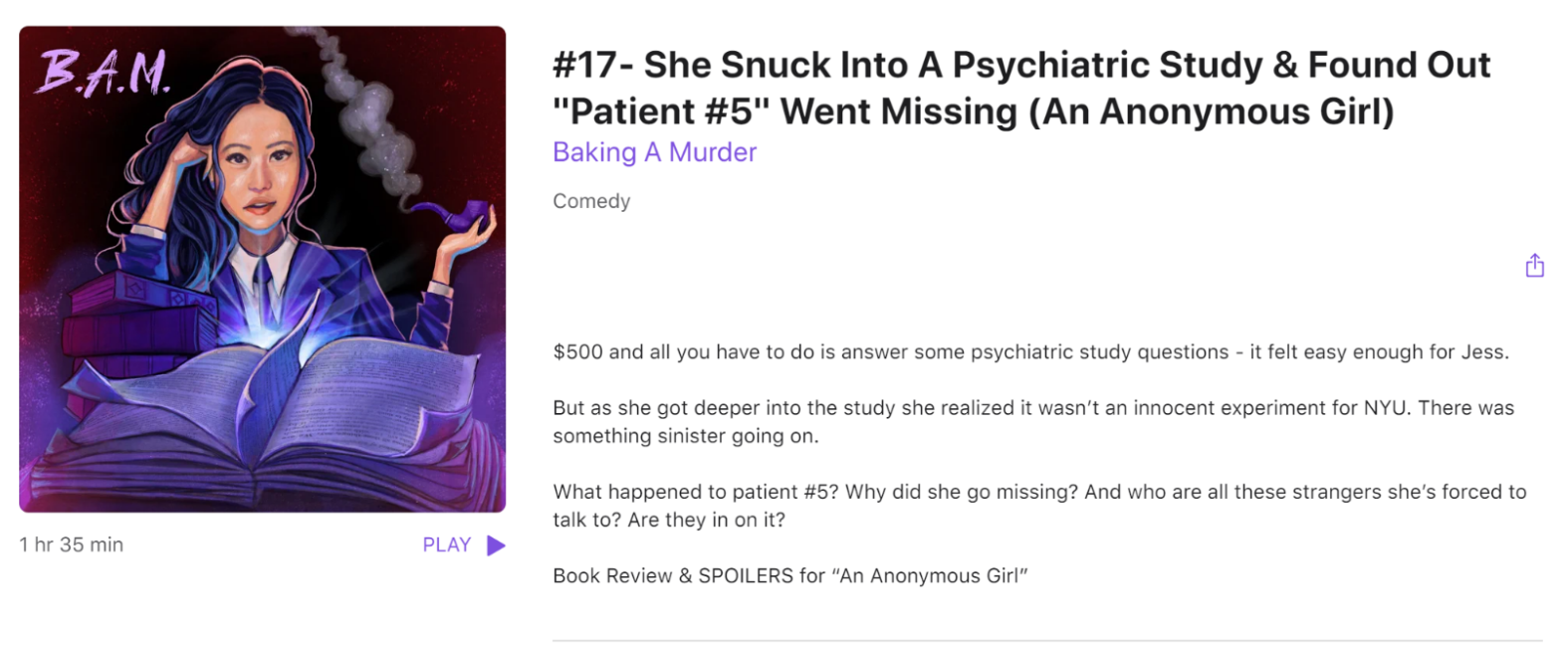
6) Touch on sensitive issues
If you’re creating good content, you undoubtedly touch on sensitive topics, whether it’s politics, dating, relationships, or health.
Girls Gotta Eat titled their podcast episode as “Are you dating a narcissist? Feat. Dr. Ramani Durvasula.”
For maximum emotional impact, they pose the question directly to the listener. They could have taken another direction with the title, but you can agree that this is more effective.
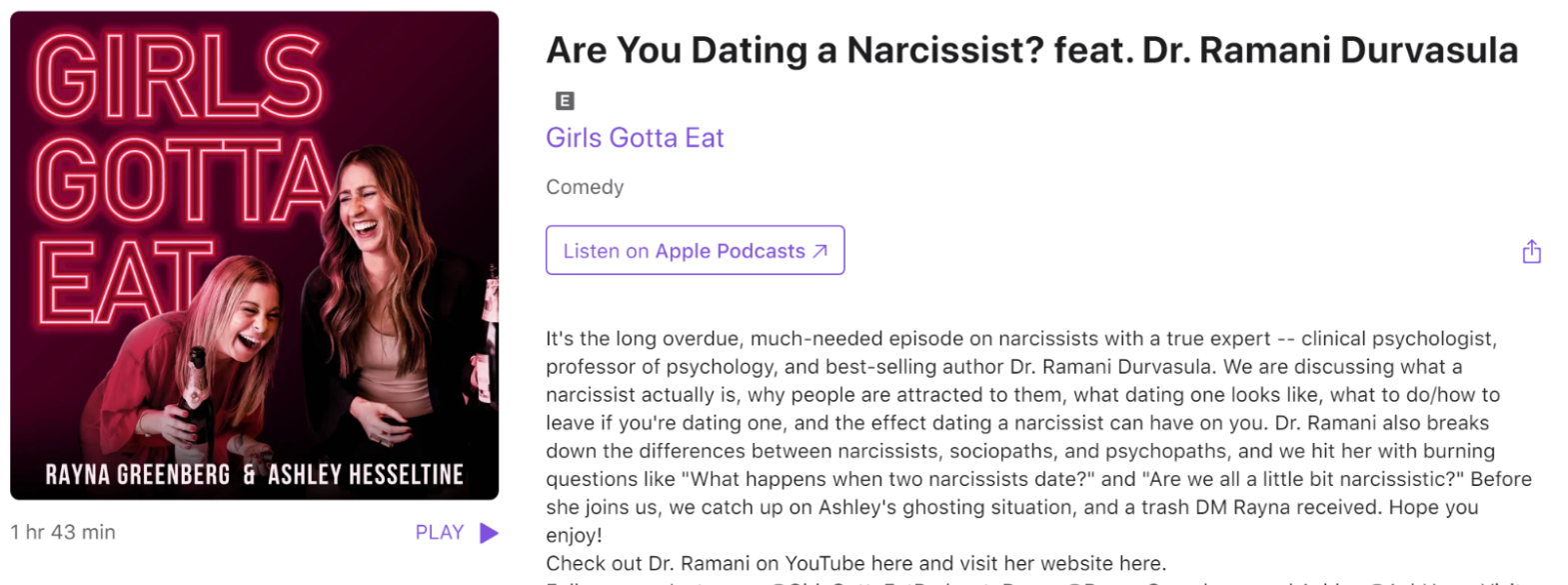
7) Make it official & authoritative-sounding
Come off as authoritative with an official-sounding title. You can take the direction of “Morbid, a True Crime” podcast. Their super catchy podcast episode title begins with “Morbid Network Presents….” You can also consider other terms such as: Introducing
- Research
- Advice
- Study
- Secret
-
Sneak-peek
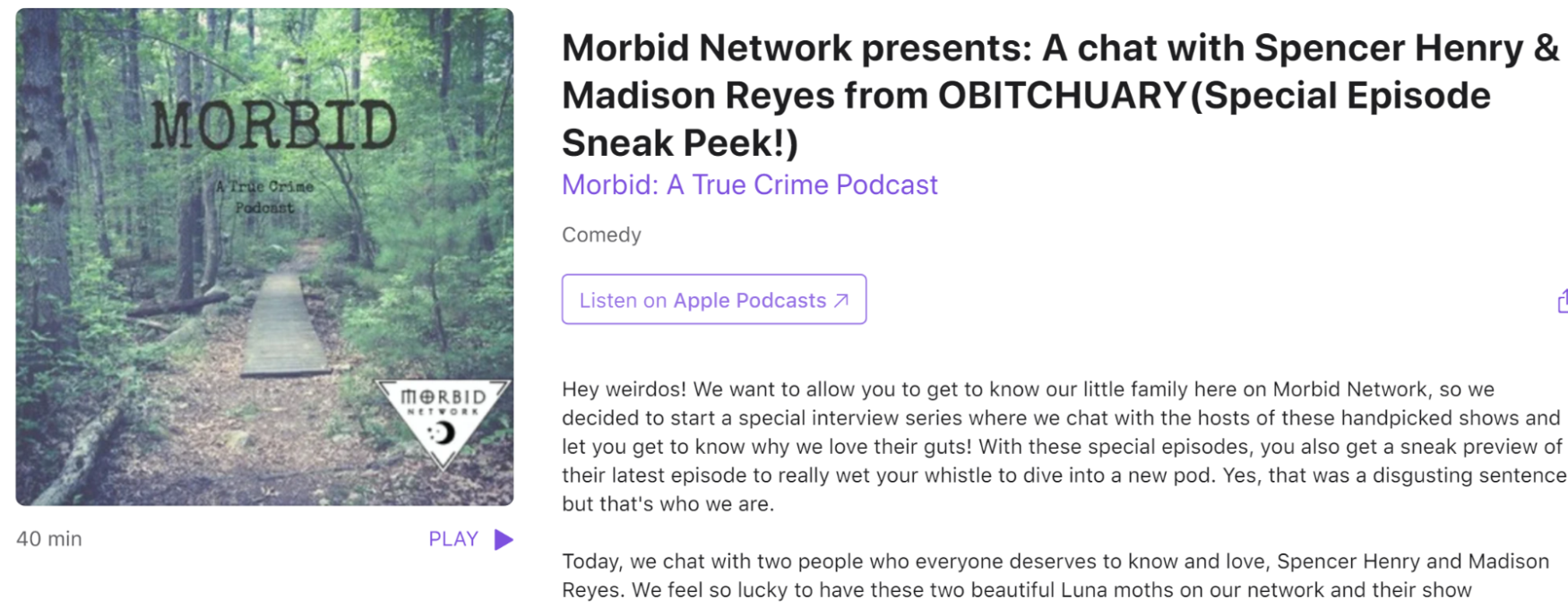
8) Add a bit of drama
Your titles should be exciting, emotional, and unexpected. That’s the literal definition of drama.
The Ramsey Show does this in their intriguing podcast episode titles such as “My Husband Is Hiding Cash in a Secret Bank Account, The Secret to Happiness Is Lowered Expectations, and My Sister Wasn’t in Dad’s Will.”
Their radio show delves into straight-up financial talk and runs for about 3 hours on 1510 WLAC. We like that the titles give their repurposed content a much more significant impact.
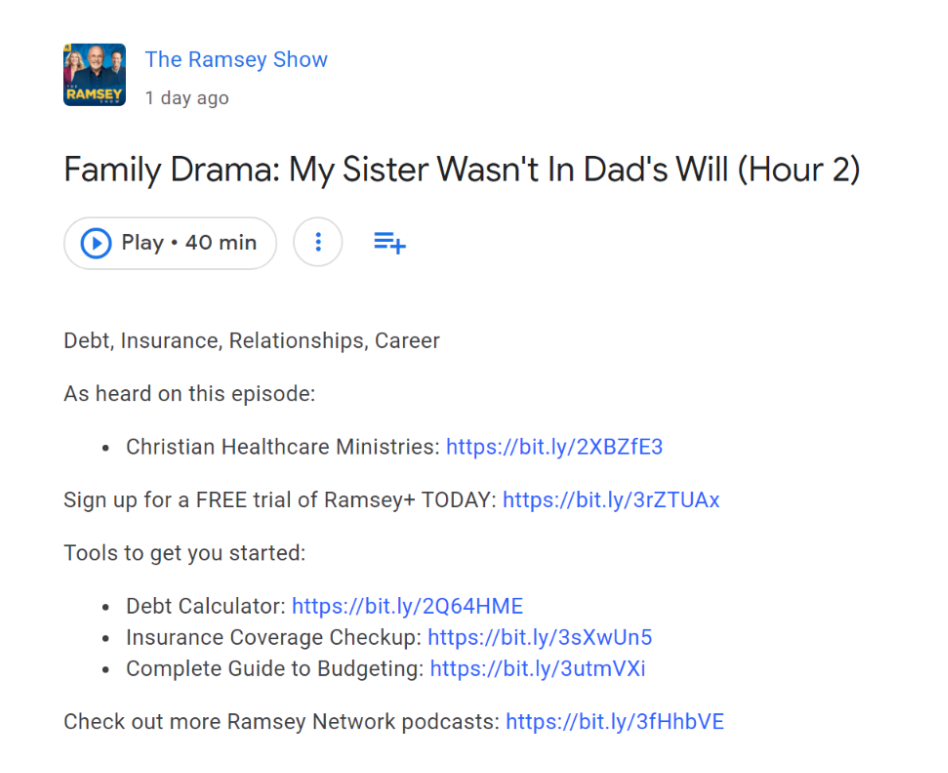
9) Be mysterious, don’t give it away soon
Another way to entice people to listen to your radio or podcast episode is to remain mysterious. Don’t give away too much, and allow listeners to discover what happened.
You can try this technique now and then, but make sure your titles are not all “clickbait.” Freakonomics implemented this technique well with the intriguing title, “That’s a great question!”
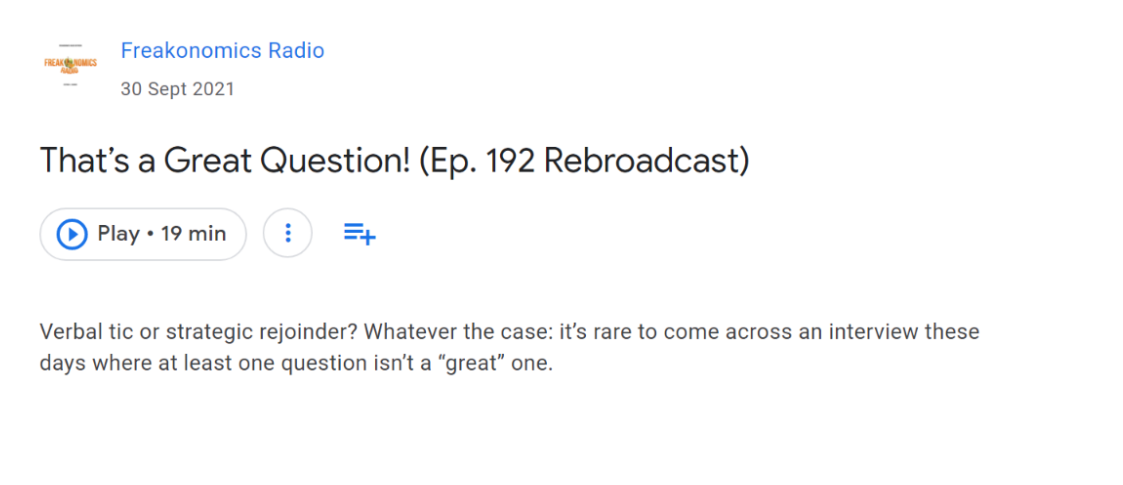
10) Negative headlines
Negative headlines outperform positive headlines. A study by Outbrain concluded that headlines with negative superlatives received 63% more engagement than positive counterparts. The brain tends to register and react more to negative stimuli.
Radio Headspace focuses on wellness topics with plenty of positive episode titles. Admittedly, the headline that caught our attention reads “The Dark Side of the Mind.”
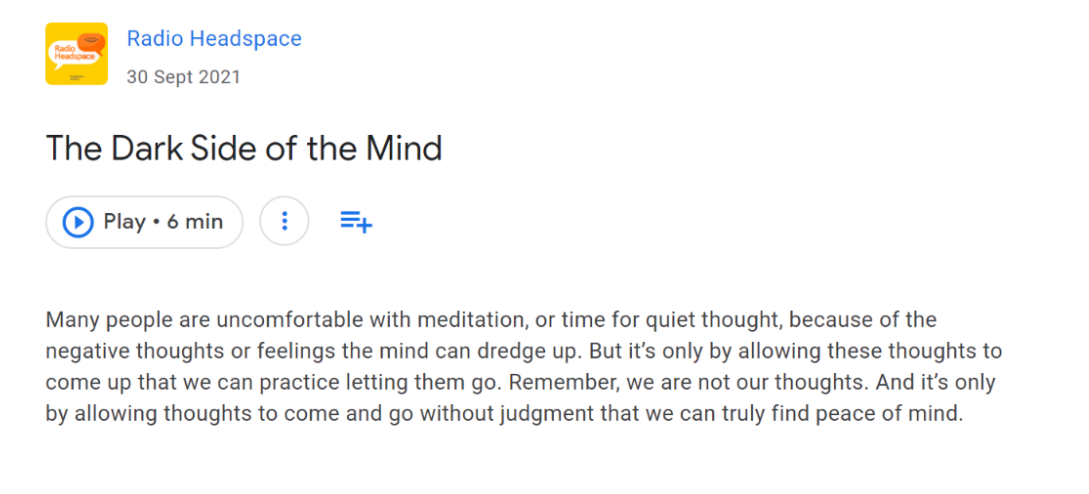
11) Scary & mythical
Scary and mythical titles can draw the listener’s attention more than ordinary and plain headlines. That’s the direction BBC World Service took by naming their interview with Ariel Dorfman, a prominent novelist, as “Ghosts of the past.” It has a nice ring to it too.
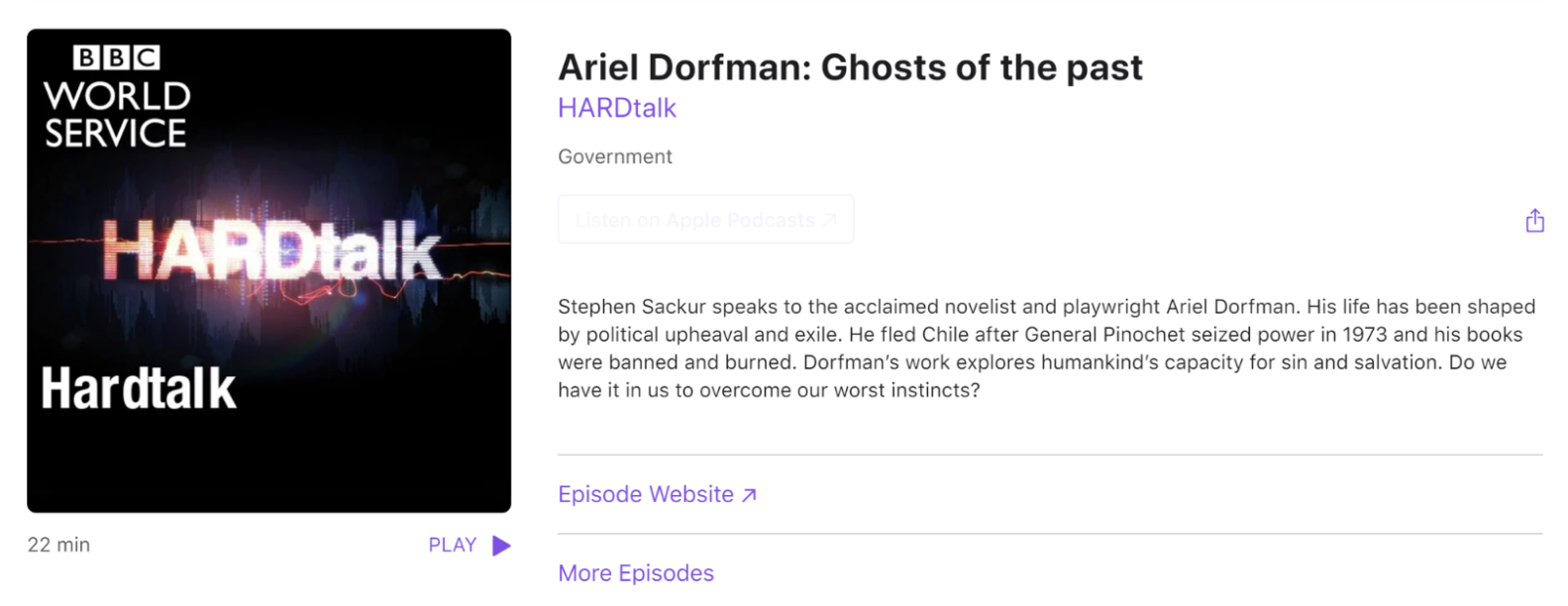
12) Scandalous
Can you think of something more intriguing than a scandal? Scandals are particularly fascinating because they are fundamentally, legally, and morally wrong. They cause anger and outrage, which are powerful emotions.
The All American Scandal podcast writes scandalous headlines such as “LA Steals Its Water and The Clinton-Lewinsky Affair | Forbidden Love.”
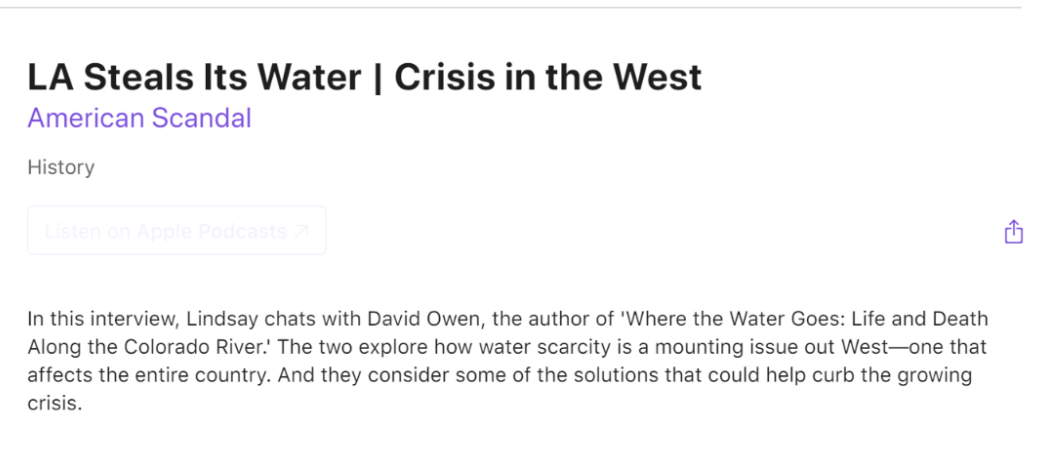
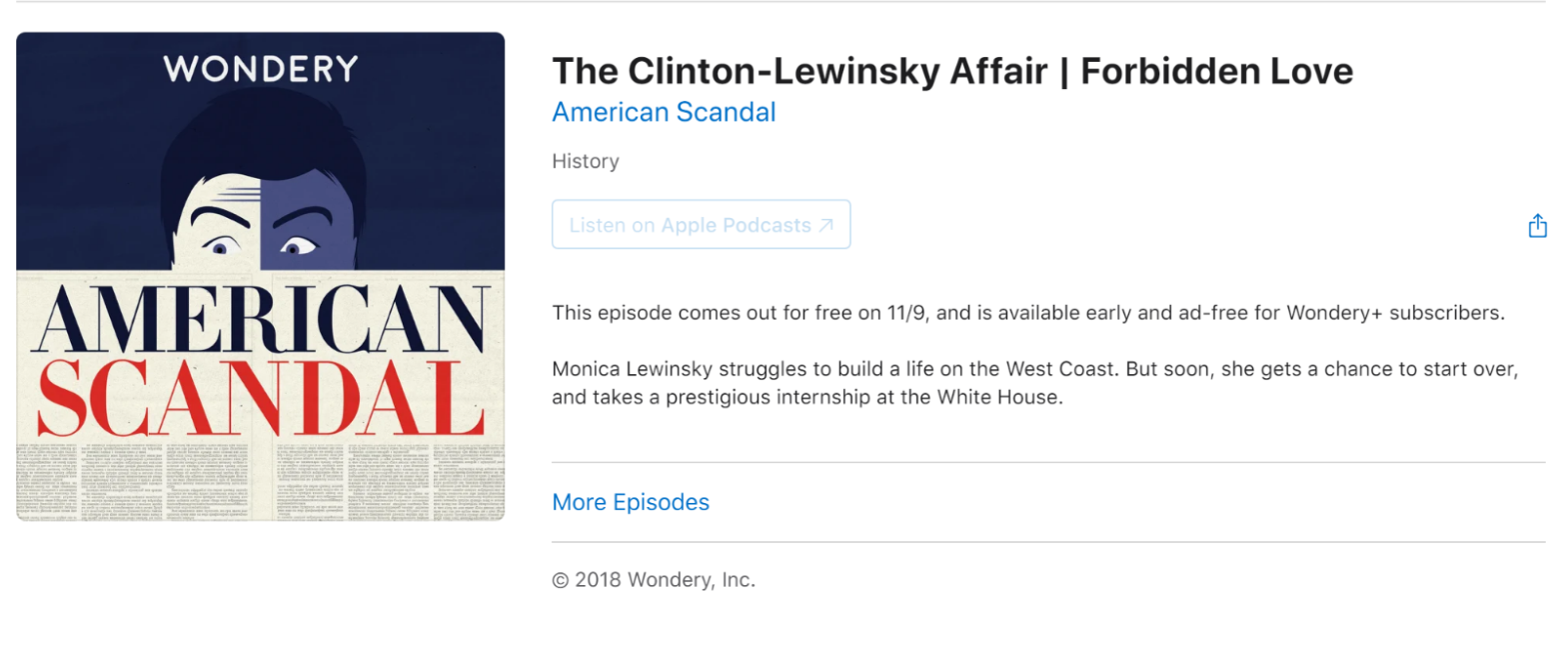
Things to Consider As You Name Your Radio and Podcast Episodes
You now have some ideas on how to format your radio and podcast titles. The learning does not end here. There are other things to know, such as the recommended title lengths and whether you should write the episode numbers. Let’s consider the tips:
Tip 1: Start with the title
Start with the title first before producing the entire episode. The heading can help guide the direction the show will take.
Tip 2: Keep it short
You should always keep your podcast and radio episode titles short and to the point. So what’s the ideal podcast episode title length? Shoot for about 60 characters with spaces.
Tip 3: Base the title on the most exciting aspect of the show
Select the most interesting part of the episode and base your title around that. It’s sure to work with interviews or call-in shows.
Tip 4: Think of the target audience
You should have a clearly defined target audience to write great titles effectively. ●Are you appealing to 25 to 34-year-olds? ●Is your content directed towards musicians, chess players, or parents?
Once you know who you’re targeting, think of things they will find appealing.
Tip 5: Optimize your episode titles for SEO
You should consider making your episode titles optimized for SEO, which stands for search engine optimization —the art of trying to get found on Google, Bing, and other search engines.
The best way to optimize your podcast titles is to include search terms users may use to find the content. You can also think of questions they may ask. For instance, if your podcast goes into cooking pizza, you can use relevant search terms such as Pizza recipes.
Tip 6: Avoid clickbait - Deliver what you have promised
You should avoid clickbait as much as you can. The title should promise and deliver without misleading listeners about the nature of the content. Clickbait content often makes users feel cheated.
Tip 7: How to handle titles with “Episode Numbers.”
Should you start your episode titles with “Episode 1: or similar.?” Or is it better to put the episode information at the end of the title.
The advice is to avoid beginning with the episode information. On most podcast directories, listeners can only see about 25 to 30 characters. The rest of the title is truncated.
If you want to include the episode number, consider a short version such as “30…” not “Episode 30….”
Tip 8: Experiment and have more variety
Don’t just stick to one format, such as posing each episode title as a question. Each episode delves into different topics and content. So, aim to have different podcast titles, each optimized for maximum effectiveness.
Tip 9: Analyze the effectiveness of your titles
You should keep analyzing the effectiveness of your podcast and radio episode titles. Different platforms offer listenership metrics, such as completion rates.
You can draw various insights by looking at the data. If your content is drawing plenty of listeners, but people don’t listen for too long, you may consider improving the accuracy of the title to match the content or placing important information closer to the start. You may offer a preview or tease to keep people listening.
Bottom line
As you write more podcast or radio episode titles, you’ll find that you’ll get better and better.
Continue practicing, ask for feedback, and learn from other shows.
That’s all for today. If you need radio hosting services, take a look at our affordable services here.

